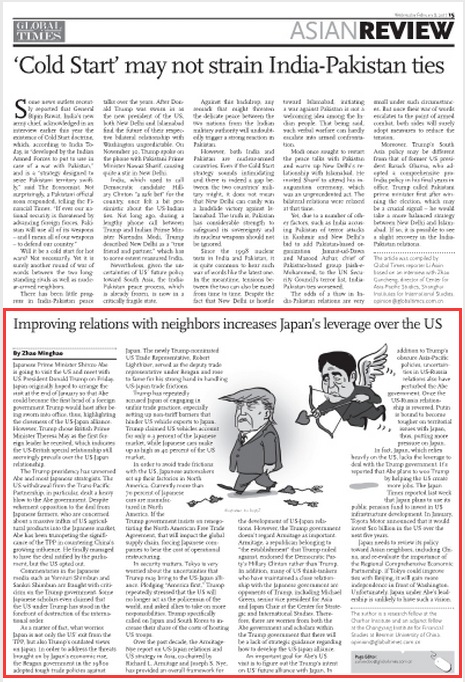Major Power Relations
Your Present Location: PROGRAMS> Major Power RelationsZhao Minghao: Improving relations with neighbors increases Japan’s leverage over the US
By Zhao Minghao Source: Global Times Published: 2017-2-7
Japanese Prime Minister Shinzo Abe is going to visit the US and meet with US President Donald Trump on Friday. Japan originally hoped to arrange the visit at the end of January so that Abe could become the first head of a foreign government Trump would host after being sworn into office, thus, highlighting the closeness of the US-Japan alliance. However, Trump chose British Prime Minister Theresa May as the first foreign leader he received, which indicates the US-British special relationship still seemingly prevails over the US-Japan relationship.

The Trump presidency has unnerved Abe and most Japanese strategists. The US withdrawal from the Trans-Pacific Partnership, in particular, dealt a heavy blow to the Abe government. Despite vehement opposition to the deal from Japanese farmers, who are concerned about a massive influx of US agricultural products into the Japanese market, Abe has been trumpeting the significance of the TPP in countering China`s growing influence. He finally managed to have the deal ratified by the parliament, but the US opted out.
Commentaries in the Japanese media such as Yomiuri Shimbun and Sankei Shimbun are fraught with criticism on the Trump government. Some Japanese scholars even claimed that the US under Trump has stood in the forefront of destruction of the international order.
As a matter of fact, what worries Japan is not only the US` exit from the TPP, but also Trump`s outdated views on Japan. In order to address the threats brought on by Japan`s economic rise, the Reagan government in the 1980s adopted tough trade policies against Japan. The newly Trump-nominated US Trade Representative, Robert Lighthizer, served as the deputy trade representative under Reagan and rose to fame for his strong hand in handling US-Japan trade frictions.
Trump has repeatedly accused Japan of engaging in unfair trade practices, especially setting up non-tariff barriers that hinder US vehicle exports to Japan. Trump claimed US vehicles account for only 0.3 percent of the Japanese market, while Japanese cars make up as high as 40 percent of the US market.
In order to avoid trade frictions with the US, Japanese automakers set up their factories in North America. Currently more than 70 percent of Japanese cars are manufactured in North America. If the Trump government insists on renegotiating the North American Free Trade Agreement, that will impact the global supply chain, forcing Japanese companies to bear the cost of operational restructuring.
In security matters, Tokyo is very worried about the uncertainties that Trump may bring to the US-Japan alliance. Pledging "America first," Trump repeatedly stressed that the US will no longer act as the policeman of the world, and asked allies to take on more responsibilities. Trump specifically called on Japan and South Korea to increase their share of the costs of hosting US troops.
Over the past decade, the Armitage-Nye report on US-Japan relations and US strategy in Asia, co-chaired by Richard L. Armitage and Joseph S. Nye, has provided an overall framework for the development of US-Japan relations. However, the Trump government doesn`t regard Armitage as important. Armitage, a republican belonging to "the establishment" that Trump railed against, endorsed the Democratic Party`s Hillary Clinton rather than Trump. In addition, many of US think-tankers who have maintained a close relationship with the Japanese government are opponents of Trump, including Michael Green, senior vice president for Asia and Japan Chair at the Center for Strategic and International Studies. Therefore, there are worries from both the Abe government and scholars within the Trump government that there will be a lack of strategic guidance regarding how to develop the US-Japan alliance.
An important goal for Abe`s US visit is to figure out the Trump`s intent on US` future alliance with Japan. In addition to Trump`s obscure Asia-Pacific policies, uncertainties in US-Russia relations also have perturbed the Abe government. Once the US-Russia relationship is reversed, Putin is bound to become tougher on territorial issues with Japan, thus, putting more pressure on Japan.
In fact, Japan, which relies heavily on the US, lacks the leverage to deal with the Trump government. It`s reported that Abe plans to woo Trump by helping the US create more jobs. The Japan Times reported last week that Japan plans to use its public pension fund to invest in US infrastructure development. In January, Toyota Motor announced that it would invest $10 billion in the US over the next five years.
Japan needs to review its policy toward Asian neighbors, including China, and re-evaluate the importance of the Regional Comprehensive Economic Partnership. If Tokyo could improve ties with Beijing, it will gain more independence in front of Washington. Unfortunately, Japan under Abe`s leadership is unlikely to have such a vision.
The author is a visiting fellow at the Chongyang Institute for Financial Studies at Renmin University of China.
Key Words: US; Japan; Abe























































































 京公网安备 11010802037854号
京公网安备 11010802037854号





